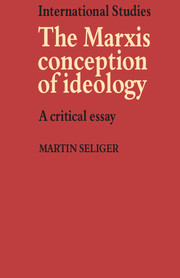Summary
In my comments on the unadjusted ramifications of the orthodox Marxist theory of ideology I have already indicated that its action orientation drove it, like all other ideologies, towards asymmetry – one side of a coin of which ideological pluralism is the other side. Indeed, asymmetry is as much inherent in ideologies as ideological pluralism is the inescapable corollary of the endeavour to realize an ideology. In the process, asymmetry as evinced in ideological pluralism grows to the point of dividing an ideology into a fundamental and an operative dimension of argumentation. On these grounds, it therefore seems appropriate by way of concluding the present study to sum up the significance of ideological pluralism for assessing the gist of the Marxist theory of ideology, which embodies the central hypotheses offered by Marxism for the understanding of social life. I propose to do so by elaborating briefly on two intertwined conclusions which I have already demonstrated.
Firstly, since ideological pluralism attests that disagreement between ideologies is far from being total, it calls in question the assumption that the contents and categories of thought can be unequivocally related to a specific class structure and the specific conditions of an epoch.
- Type
- Chapter
- Information
- The Marxist Conception of IdeologyA Critical Essay, pp. 202 - 210Publisher: Cambridge University PressPrint publication year: 1977

